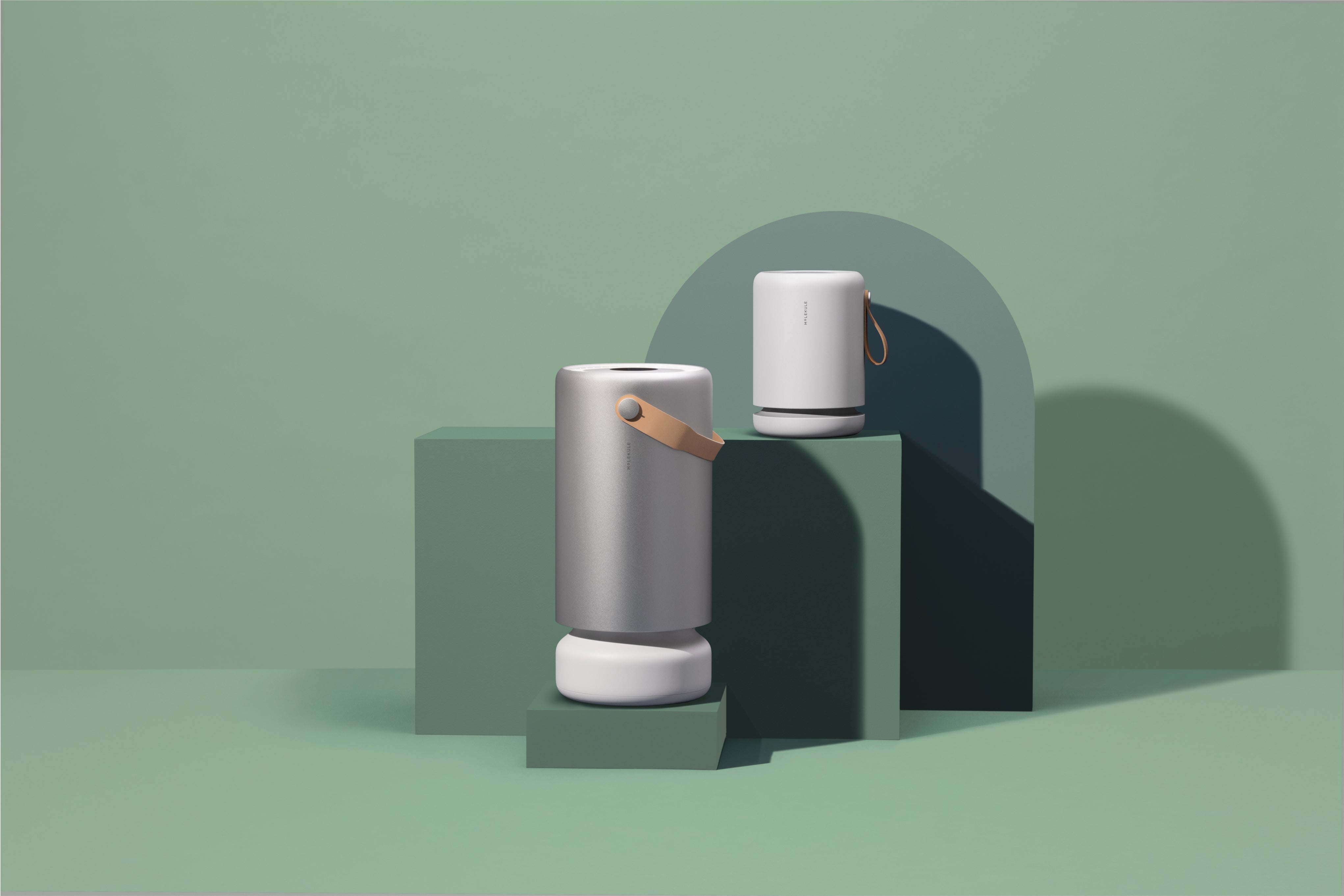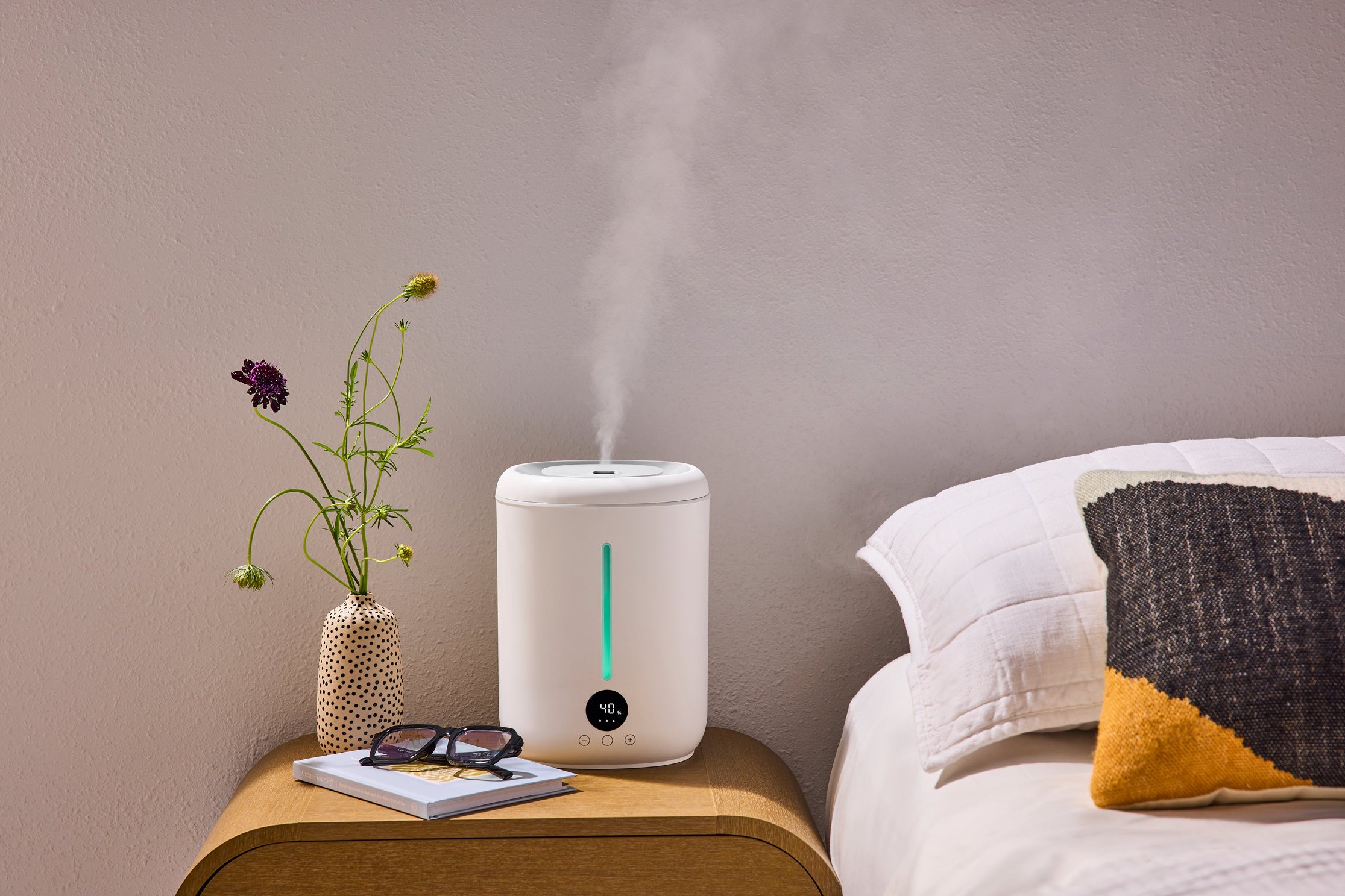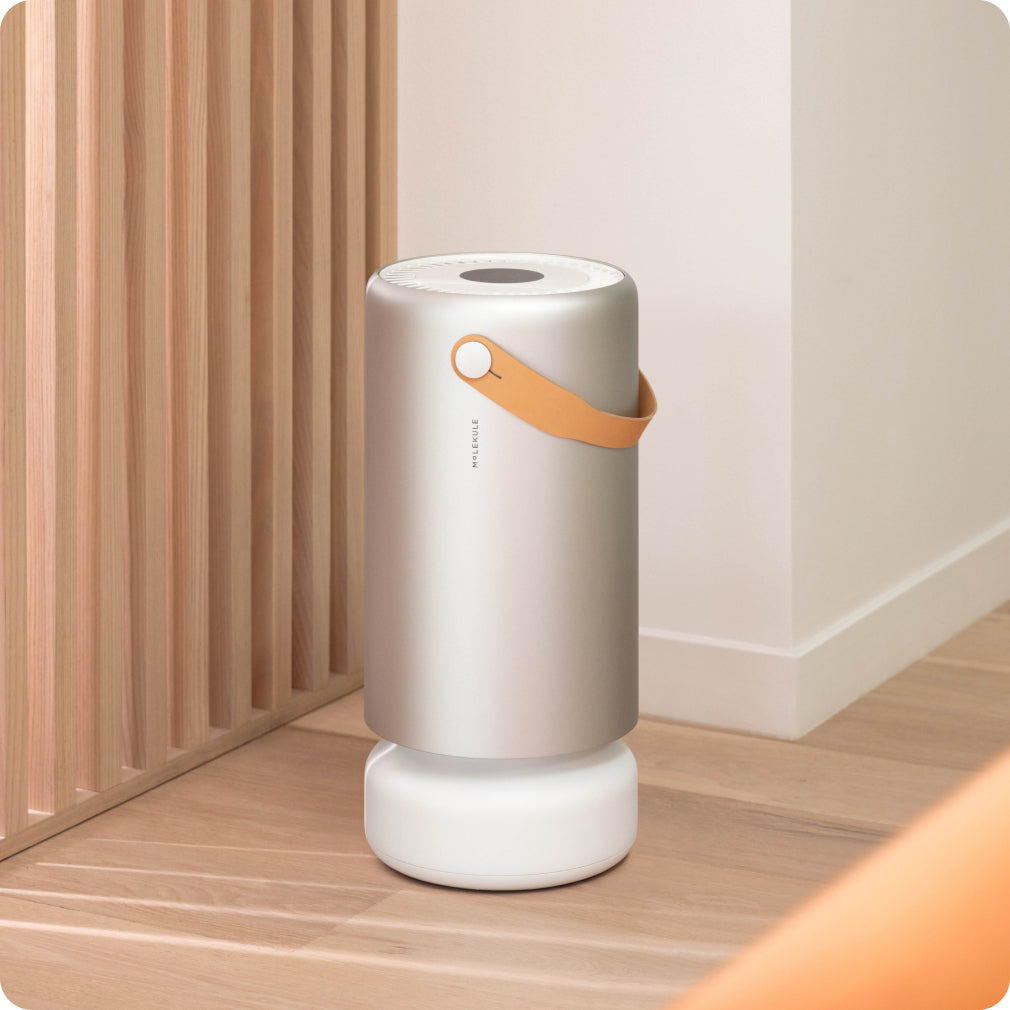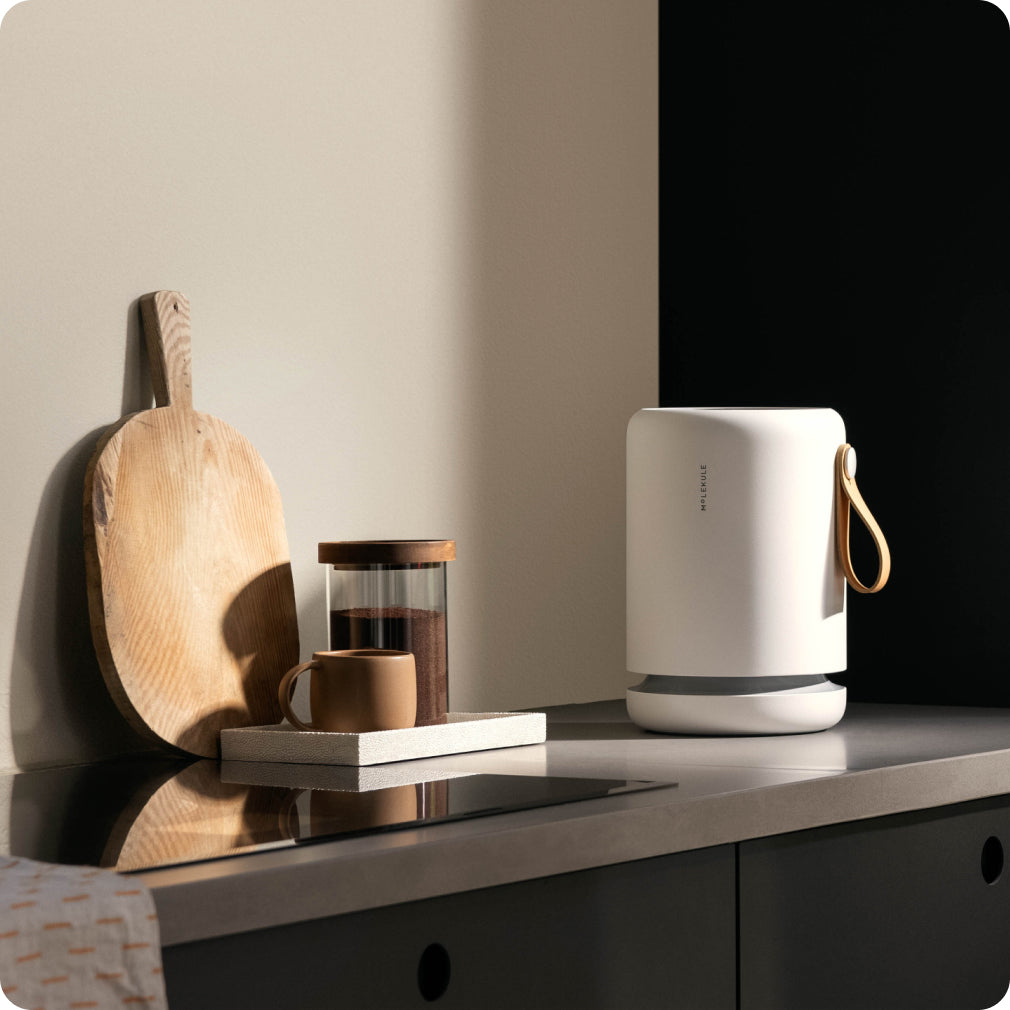If you’ve ever tossed and turned on a hot night or woken up feeling dry and congested, your room’s temperature and humidity might be to blame. These two factors play a major role in how well you sleep by influencing your body’s natural cooling process and breathing comfort. Even when your thermostat is set just right, the air itself matters.
Clean, balanced air free from allergens and pollutants can help you fall asleep faster and stay asleep longer. That’s where advanced air purification systems come in, helping to maintain a healthy, comfortable sleep environment.
Key Takeaways
-
Ideal Temperature: Between 60–67°F (15–19°C) for most adults
-
Optimal Humidity: Between 30–50% to prevent dryness and mold growth
-
Why It Matters: Your body cools down by 1–2°F during sleep to regulate cycles
-
Health Effects: Every degree above 70°F can decrease sleep efficiency
-
Smart Solution: Air purifiers that destroy allergens improve air quality and sleep comfort
How Temperature Affects Sleep
Your body’s internal thermostat plays a key role in regulating sleep. As bedtime approaches, your core temperature naturally drops by 1–2 degrees, signaling to your brain that it’s time to rest. Cooler environments help maintain this drop, while hot or cold rooms interfere with your ability to stay asleep.
Studies show that the best sleep happens between 60 and 67°F. When temperatures rise above 70°F, people spend more time awake and experience shorter REM and deep sleep stages: the most restorative parts of the night.
Keeping your bedroom cool helps your body conserve energy, stay comfortable under blankets, and cycle naturally through the stages of sleep.
How Humidity Affects Sleep
Humidity affects how your body cools itself and how easily you breathe. The ideal range for most people is 30–50% relative humidity.
High humidity (over 60%) makes air feel heavy, prevents sweat from evaporating, and encourages dust mites and black mold growth. This can lead to congestion, coughing, nighttime awakenings, and more serious symptoms.
Low humidity (under 30%) dries out your throat, nose, and skin, leading to irritation, nosebleeds, and snoring.
Balanced humidity helps you maintain steady breathing, reduce allergens, and prevent the sticky or overly dry feeling that can make it hard to stay asleep.
The Combined Effect of Temperature and Humidity
The perfect sleep environment isn’t just about how warm or cool your room feels. It’s about how air, moisture, and temperature interact. Research shows that around 68°F (20°C) with moderate humidity creates optimal sleep comfort for most people.
When humidity or temperature drifts too far in either direction, your body works harder to maintain balance. This can leave you tossing, turning, or waking up unrefreshed. Proper climate control and clean air make it easier for your body to stay in deep sleep longer.
Creating the Perfect Sleep Environment
You can fine-tune your bedroom for comfort with a few practical changes:
-
Set the thermostat: Keep it between 60–67°F at night.
-
Monitor humidity: Use a hygrometer or smart thermostat to stay within the 30–50% range.
-
Use the right tools: Dehumidifiers help during humid months. Humidifiers add moisture in dry climates or during winter. Air purifiers remove allergens, like pollen or dust, that can cause congestion.
-
Choose breathable bedding: Cotton and linen help regulate body heat.
-
Keep airflow consistent: Slightly open windows or run a quiet fan for fresh air circulation.
Where Standard Systems Fall Short
Most HVAC systems only regulate temperature and lack precise humidity control. They also recirculate dust, mold spores, and pet dander unless upgraded with high-quality filtration. Even with perfect temperature settings, poor air quality can cause congestion and allergy flare-ups that interrupt sleep.
Portable dehumidifiers and basic HEPA purifiers also have limits. They can be noisy, require frequent maintenance, and only trap particles rather than destroying them.
The Role of Air Purification in Better Sleep
Air quality is a major factor in overall sleep health. Molekule’s PECO-HEPA technology addresses what standard filters can’t. Instead of merely capturing particles, it removes mold spores and destroys allergens and volatile compounds at the molecular level, reducing the triggers that cause nighttime congestion or irritation.
Independent testing has shown that Molekule’s systems remove up to 92% of allergen proteins within an hour, compared to just 8% by traditional HEPA filters. The result is cleaner, fresher air that supports deeper, uninterrupted sleep.

Best Options for Bedrooms
The Molekule Air Pro covers up to 1,000 square feet and adjusts automatically to changing air conditions. Its quiet 30–65 dB operation ensures it won’t disturb your rest.
The Molekule Air Mini+ is ideal for smaller rooms (up to 250 square feet) and children’s bedrooms. Compact yet powerful, it keeps air consistently clean throughout the night.
Both devices combine continuous purification with whisper-quiet operation: two essentials for maintaining a calm sleep space.
Adjusting for Different Age Groups
Infants and Children: Slightly warmer rooms (65–70°F) are safer and more comfortable since babies can’t regulate body heat as well as adults. Use a home air purifier to maintain clean air without drafts.
Older Adults: Research suggests adults over 65 sleep best between 68–77°F, as their bodies cool less efficiently. Cleaner air also becomes increasingly important as immune function declines.
Putting It All Together
To get your best night’s sleep:
-
Keep the temperature between 60–67°F for adults.
-
Maintain humidity around 40–50%.
-
Fix leaks and seal drafts to stabilize your environment.
-
Run an air purifier nightly to remove allergens and balance air quality.
-
Track your comfort: Adjust seasonally as conditions change.
Small changes to your room’s temperature, humidity, and air quality can make a big difference. When your environment supports your body’s natural rhythms, you’ll fall asleep faster, stay asleep longer, and wake up feeling more refreshed.
Frequently Asked Questions
What is the ideal bedroom temperature for sleep?
The optimal sleeping temperature for most adults ranges between 60 to 67°F (15.6 to 19.4°C), with 65-67°F being most common. This range supports natural thermoregulation and REM sleep cycles while preventing both overheating and excessive cold exposure.
How does humidity affect sleep quality?
Humidity levels between 30-50% provide optimal sleep conditions. High humidity above 60% increases wakefulness, promotes dust mites and mold growth, and exacerbates breathing difficulties. Low humidity below 30% causes dry airways, throat irritation, and increased coughing that fragments sleep.
Why does temperature matter more than humidity for sleep?
Research confirms temperature serves as the primary factor affecting sleep quality, directly impacting REM sleep duration and slow-wave sleep depth. While humidity significantly influences comfort and allergen levels, temperature changes have more immediate and dramatic effects on sleep architecture.
Can air purifiers help with temperature-related sleep problems?
While air purifiers cannot directly control temperature, one of the benefits of an air purifier is that its molecular destruction technology eliminates allergens that cause sleep disruptions even in temperature-optimized environments. Clean air reduces the breathing difficulties, sneezing, and congestion that fragment sleep regardless of bedroom temperature.
What temperature is too hot for sleeping?
Temperatures above 70°F begin negatively impacting sleep quality by preventing proper thermoregulation. Each degree increase above 70°F decreases sleep efficiency by approximately 0.06% and increases both time to fall asleep and frequency of nighttime awakenings.
Should I use a humidifier or a dehumidifier in my bedroom?
If you’re debating between using a humidifier vs a dehumidifier, the solution is simple. Use humidifiers when indoor humidity falls below 30% (common in winter) and dehumidifiers when levels exceed 50% (common in summer or humid climates).







